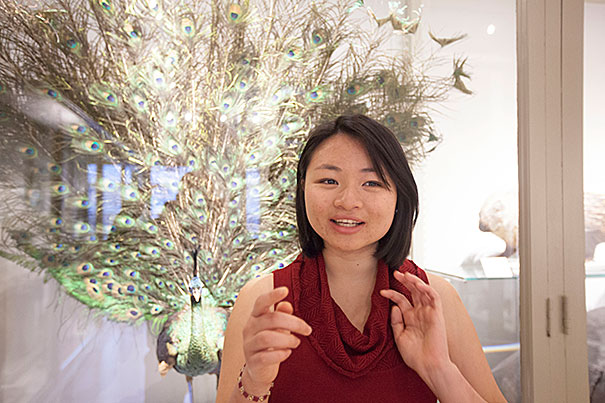
“Ever since high school, when I first discovered a passion for marine biology research, I knew I would pursue studies in environmental and conservation biology. I spent my freshman year at Harvard taking every class I could on those topics, but I knew that to really understand how research works in the natural sciences, I had to go outside and experience firsthand the mud and sweat and glory,” said Bonnie Lei ’15, who traveled to South Africa to study penguins.
Kris Snibbe/Harvard Staff Photographer
The power of penguins
Student spends memorable internship studying South African birds
Nose to beak, beady eye to eye, I offered a penguin my bare hand in greeting.
Even after my first, slightly woozy, ride in a helicopter, perched precariously with duffel bags under my arms and electronic equipment on my lap, the first thing I wanted to do upon landing was wrap a penguin in a big hug. Even as adults, these African penguins were so adorable, waddling with happy bellies full of fish. Their chicks were endearing balls of gray fluff begging to be cuddled.
“She’s a new one, isn’t she?” the park ranger behind me chuckled. “Here, sister, you’re forgetting these,” he said, handing me a pair of elbow-length gloves reinforced with duct tape – necessary because African penguins’ beaks are razor-sharp, designed to tear through flesh. And those powerful flippers of theirs, so efficient at zooming underwater, are also well designed for smacking errant researchers.
This was the first, but definitely not the last, lesson I learned while working in the field this past summer in South Africa. When I chose to attend Harvard, I knew I would relish the intellectual vitality of the campus, and immerse myself in the cultural aspects of Cambridge and nearby Boston. Yet a part of me was perhaps even more excited about the possibility of the greater world beyond.
Ever since high school, when I first discovered a passion for marine biology research, I knew I would pursue studies in environmental and conservation biology. I spent my freshman year at Harvard taking every class I could on those topics, but I knew that to really understand how research works in the natural sciences, I had to go outside and experience firsthand the mud and sweat and glory.
I found an opportunity to intern with biologists at the University of Cape Town to study the thermoregulatory behavior of African penguins. My Harvard professors and advisers encouraged me to seize this chance, and with funding from the Weissman International Internship Program, I was soon on an island with the largest breeding population of endangered African penguins in the world.
We were out every day, busy measuring the temperature of nests and areas on the island and monitoring the birds’ thermoregulatory behavior. I could walk around the island perimeter, keeping bird counts, looking out for predated penguin eggs, and even indulging in some quick plein air watercolor painting, all in less than two hours. I participated in a penguin rescue effort when the largest storm in several years blew in with gale-force winds. I even got my first shooting lesson from the rangers, who use their big guns to cull predatory gulls (and scare the occasional poacher).
Often, when you arrive at college, you become too attached to your life on campus. But I discovered that what I have learned by venturing outside Harvard’s gates has allowed me to return more passionate than ever to engage in research and advocacy. I have experienced the difficulties that come with a life of research (mosquitoes, no showers, canned beans again!), as well as the immense joys. For instance, we convinced the local fishermen to allow us to see what impact their fishing had on penguin diets, an experience I never could have found in the classroom. I am grateful that Harvard encourages and empowers its students to pursue learning outside its walls.
And for the record, despite discovering the penguins’ more aggressive qualities, oh, how much I still enjoyed them, and how much I loved my summer work.
If you’re an undergraduate or graduate student and have an essay to share about life at Harvard, please email your ideas to Jim Concannon, the Gazette’s news editor, at Jim_Concannon@harvard.edu.




